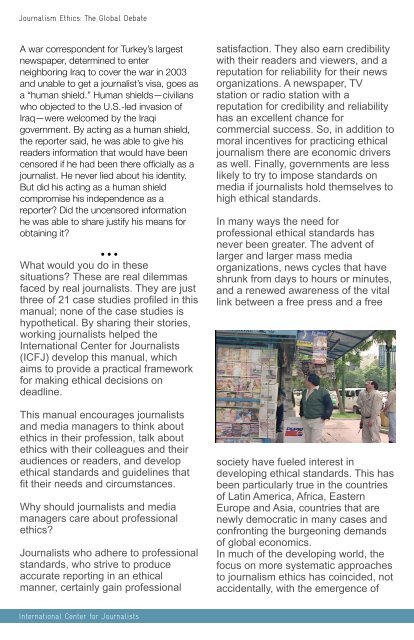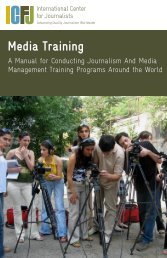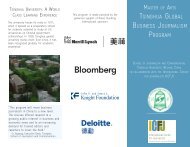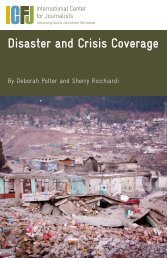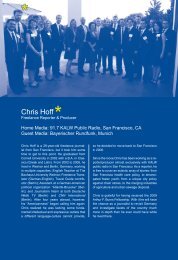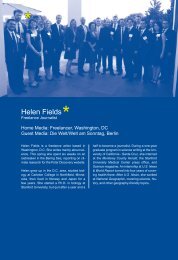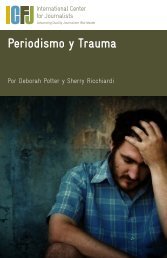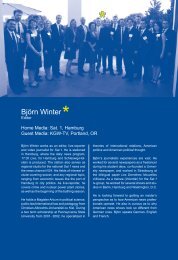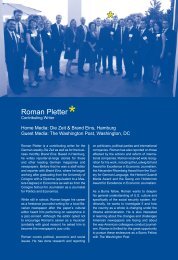Download PDF - International Center for Journalists
Download PDF - International Center for Journalists
Download PDF - International Center for Journalists
You also want an ePaper? Increase the reach of your titles
YUMPU automatically turns print PDFs into web optimized ePapers that Google loves.
Journalism Ethics: The Global Debate<br />
A war correspondent <strong>for</strong> Turkey’s largest<br />
newspaper, determined to enter<br />
neighboring Iraq to cover the war in 2003<br />
and unable to get a journalist’s visa, goes as<br />
a “human shield.” Human shields—civilians<br />
who objected to the U.S.-led invasion of<br />
Iraq—were welcomed by the Iraqi<br />
government. By acting as a human shield,<br />
the reporter said, he was able to give his<br />
readers in<strong>for</strong>mation that would have been<br />
censored if he had been there officially as a<br />
journalist. He never lied about his identity.<br />
But did his acting as a human shield<br />
compromise his independence as a<br />
reporter? Did the uncensored in<strong>for</strong>mation<br />
he was able to share justify his means <strong>for</strong><br />
obtaining it?<br />
• • •<br />
What would you do in these<br />
situations? These are real dilemmas<br />
faced by real journalists. They are just<br />
three of 21 case studies profiled in this<br />
manual; none of the case studies is<br />
hypothetical. By sharing their stories,<br />
working journalists helped the<br />
<strong>International</strong> <strong>Center</strong> <strong>for</strong> <strong>Journalists</strong><br />
(ICFJ) develop this manual, which<br />
aims to provide a practical framework<br />
<strong>for</strong> making ethical decisions on<br />
deadline.<br />
This manual encourages journalists<br />
and media managers to think about<br />
ethics in their profession, talk about<br />
ethics with their colleagues and their<br />
audiences or readers, and develop<br />
ethical standards and guidelines that<br />
fit their needs and circumstances.<br />
Why should journalists and media<br />
managers care about professional<br />
ethics?<br />
<strong>Journalists</strong> who adhere to professional<br />
standards, who strive to produce<br />
accurate reporting in an ethical<br />
manner, certainly gain professional<br />
satisfaction. They also earn credibility<br />
with their readers and viewers, and a<br />
reputation <strong>for</strong> reliability <strong>for</strong> their news<br />
organizations. A newspaper, TV<br />
station or radio station with a<br />
reputation <strong>for</strong> credibility and reliability<br />
has an excellent chance <strong>for</strong><br />
commercial success. So, in addition to<br />
moral incentives <strong>for</strong> practicing ethical<br />
journalism there are economic drivers<br />
as well. Finally, governments are less<br />
likely to try to impose standards on<br />
media if journalists hold themselves to<br />
high ethical standards.<br />
In many ways the need <strong>for</strong><br />
professional ethical standards has<br />
never been greater. The advent of<br />
larger and larger mass media<br />
organizations, news cycles that have<br />
shrunk from days to hours or minutes,<br />
and a renewed awareness of the vital<br />
link between a free press and a free<br />
society have fueled interest in<br />
developing ethical standards. This has<br />
been particularly true in the countries<br />
of Latin America, Africa, Eastern<br />
Europe and Asia, countries that are<br />
newly democratic in many cases and<br />
confronting the burgeoning demands<br />
of global economics.<br />
In much of the developing world, the<br />
focus on more systematic approaches<br />
to journalism ethics has coincided, not<br />
accidentally, with the emergence of<br />
<strong>International</strong> <strong>Center</strong> <strong>for</strong> <strong>Journalists</strong>


